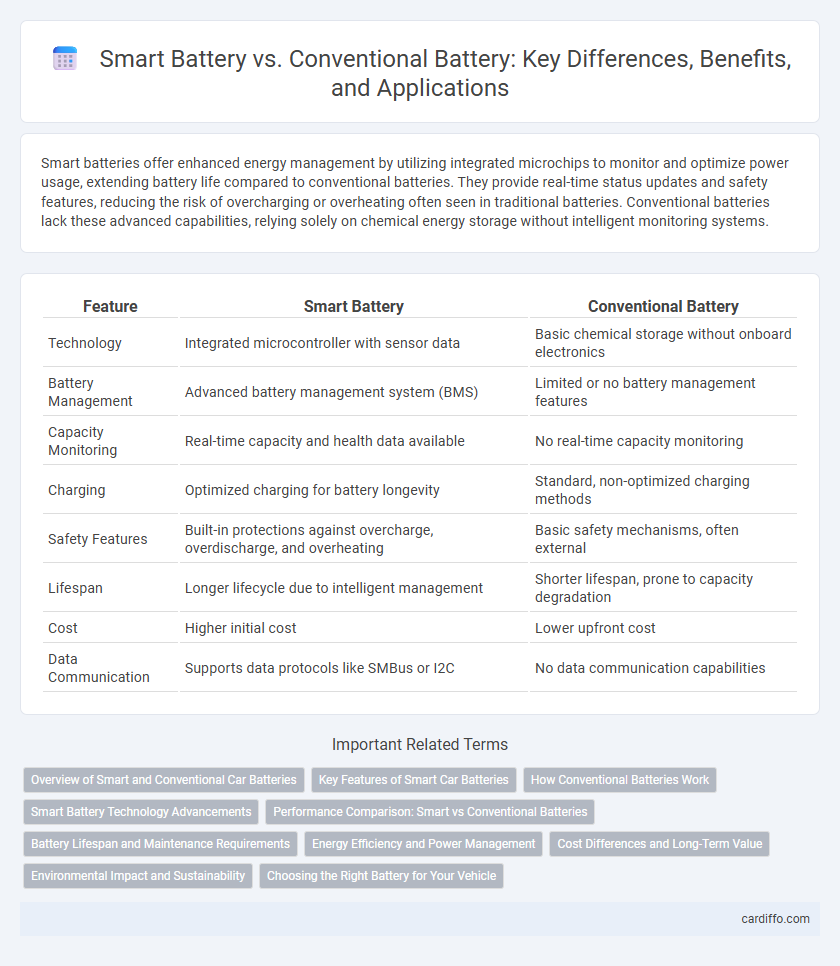Smart batteries offer enhanced energy management by utilizing integrated microchips to monitor and optimize power usage, extending battery life compared to conventional batteries. They provide real-time status updates and safety features, reducing the risk of overcharging or overheating often seen in traditional batteries. Conventional batteries lack these advanced capabilities, relying solely on chemical energy storage without intelligent monitoring systems.
Table of Comparison
| Feature | Smart Battery | Conventional Battery |
|---|---|---|
| Technology | Integrated microcontroller with sensor data | Basic chemical storage without onboard electronics |
| Battery Management | Advanced battery management system (BMS) | Limited or no battery management features |
| Capacity Monitoring | Real-time capacity and health data available | No real-time capacity monitoring |
| Charging | Optimized charging for battery longevity | Standard, non-optimized charging methods |
| Safety Features | Built-in protections against overcharge, overdischarge, and overheating | Basic safety mechanisms, often external |
| Lifespan | Longer lifecycle due to intelligent management | Shorter lifespan, prone to capacity degradation |
| Cost | Higher initial cost | Lower upfront cost |
| Data Communication | Supports data protocols like SMBus or I2C | No data communication capabilities |
Overview of Smart and Conventional Car Batteries
Smart car batteries incorporate advanced electronics to monitor charge levels, temperature, and overall health, enhancing performance and longevity. Conventional batteries rely on basic chemical reactions without integrated sensors, making them less efficient in energy management. The integration of smart technology enables real-time diagnostics and optimization, setting smart batteries apart in modern automotive applications.
Key Features of Smart Car Batteries
Smart car batteries integrate advanced sensors to monitor real-time battery health, voltage, and temperature, ensuring optimal performance and longevity. These batteries support intelligent communication with the vehicle's electronic control unit (ECU) to optimize energy usage and provide precise state-of-charge information. Enhanced safety features such as overcharge protection and thermal management differentiate smart batteries from conventional lead-acid batteries.
How Conventional Batteries Work
Conventional batteries generate electrical energy through chemical reactions inside cells that convert stored chemical energy into electrical power. These batteries typically consist of electrodes, an electrolyte, and separators that facilitate ion flow to produce current. Their performance and lifespan depend on factors such as electrode materials and operating conditions, but they lack the integrated electronics found in smart batteries.
Smart Battery Technology Advancements
Smart battery technology advancements integrate sophisticated microprocessors that monitor and optimize energy usage, enhancing battery lifespan and efficiency. These batteries feature real-time communication with devices, enabling precise state-of-charge and health diagnostics compared to conventional batteries. Improved energy management algorithms and adaptive charging protocols significantly reduce risks of overcharging and overheating, promoting safer and more reliable performance in modern electronics.
Performance Comparison: Smart vs Conventional Batteries
Smart batteries offer enhanced performance through integrated sensors that monitor charge levels, temperature, and health, enabling optimized energy usage and prolonged lifespan compared to conventional batteries. Conventional batteries lack real-time monitoring capabilities, often resulting in suboptimal charge cycles and reduced overall efficiency. As a result, smart batteries deliver more reliable power output and improved safety features, making them superior for applications requiring consistent performance.
Battery Lifespan and Maintenance Requirements
Smart batteries incorporate advanced battery management systems that optimize charge cycles, significantly extending battery lifespan compared to conventional batteries. Equipped with real-time monitoring and self-regulation features, smart batteries reduce maintenance requirements by preventing overcharging and deep discharges. Conventional batteries often experience shorter lifespans and require frequent manual maintenance due to their lack of intelligent control and protection mechanisms.
Energy Efficiency and Power Management
Smart batteries enhance energy efficiency by integrating advanced power management systems that optimize charge cycles and reduce energy waste, extending overall battery lifespan. Conventional batteries lack these intelligent features, often resulting in inconsistent power delivery and faster energy depletion. The adaptive controls in smart batteries enable precise monitoring of energy consumption, ensuring reliable performance for devices with varying power demands.
Cost Differences and Long-Term Value
Smart batteries often have higher upfront costs compared to conventional batteries due to integrated microchips that monitor performance and optimize energy use. Over time, smart batteries provide greater long-term value by extending battery life, improving safety, and reducing maintenance expenses. Conventional batteries may be cheaper initially but typically require more frequent replacement, leading to higher total ownership costs.
Environmental Impact and Sustainability
Smart batteries enhance environmental sustainability by incorporating advanced energy management systems that optimize charging cycles, reducing unnecessary power consumption and extending battery lifespan. Unlike conventional batteries, which often lead to higher waste due to shorter usability and inefficient energy use, smart batteries support recycling programs through integrated monitoring of performance degradation. These innovations minimize hazardous waste and lower the carbon footprint associated with battery production and disposal, promoting a greener energy ecosystem.
Choosing the Right Battery for Your Vehicle
Smart batteries offer enhanced energy management and longer lifespan through integrated sensors and microprocessors, optimizing charge cycles and performance. Conventional batteries, while typically more affordable, lack advanced monitoring features and may require more frequent maintenance and replacements. Selecting the right battery for your vehicle depends on factors like driving habits, climate conditions, and budget, with smart batteries providing superior efficiency for modern, electronics-heavy vehicles.
Smart Battery vs Conventional Battery Infographic

 cardiffo.com
cardiffo.com